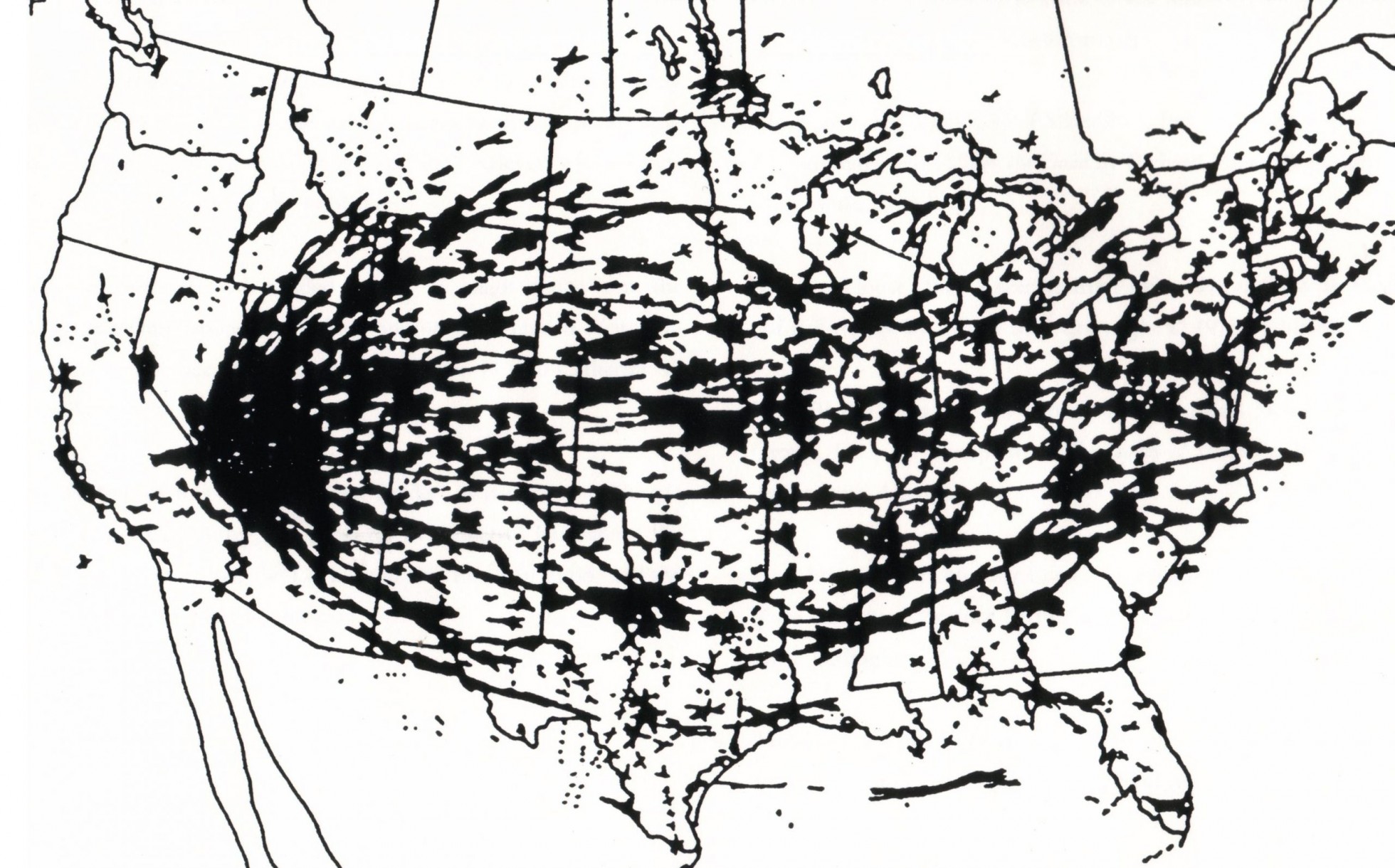
Radiation Exposure Compensation
Stripped from US Defense Bill
Zack Budryk / The Hill
(December 6, 2023) — A bipartisan amendment to expand compensation for Americans exposed to atomic radiation by the government has been removed from the final version of the annual National Defense Authorization Act (NDAA), Sen. Josh Hawley (R-Mo.) said Wednesday evening.
The amendment, which Hawley cosponsored with Sens. Ben Ray Lujan (D-N.M.), Eric Schmitt (R-Mo.) and Mike Crapo (R-Idaho), would expand and reauthorize the Radiation Exposure Compensation Act (RECA).
The original law, passed in 1990, compensates Americans exposed to atomic testing and radiation from ore mining in Utah, Nevada and Arizona.
However, it does not cover New Mexico, the site of the 1945 trinity test of the atomic bomb, nor does it cover Missouri, where wartime production of uranium resulted in the contamination of Coldwater Creek in St. Louis.

Radiation spread from US Nevada nuclear tests.
The amendment would expand the bill to cover New Mexico, Missouri, Idaho, Montana, Guam and Colorado. It would also reauthorize the law for another 19 years. President Biden extended the law a further two years in 2022 but without action, it will sunset in 2024.
Hawley had previously threatened to vote against the final NDAA if the amendment is removed in conference, as well as attempt to block it. The amendment passed the Senate with a supermajority, but the House version of the NDAA that passed earlier this year did not include it.
Reached for comment, Lujan and Schmitt both told The Hill they backed the amendment’s inclusion in the conference bill but would not commit to joining Hawley in voting against it or blocking it.
“This is a major betrayal of thousands and thousands of Missourians who have been lied to and ignored for years,” Hawley tweeted Wednesday evening. “As I promised, I will vote against this bill that betrays the commitment this nation made to nuclear test victims — and do everything in my power to stop it.”

Compensation for Victims of
US Nuke Tests Stripped from NDAA
Sen. Josh Hawley Describes Decision as a ‘Grave Injustice’
Activists Call the Action ‘Shockingly Immoral’
Connor Echols / Responsible Statecraft
(December 8, 2023) — Congressional leaders stripped a measure from this year’s defense policy bill that would have expanded compensation for victims of US nuclear testing, drawing condemnation from lawmakers who had spearheaded the initiative and bitter disappointment from activists who hoped the blockbuster film “Oppenheimer” would bolster support for their efforts.
“This is a grave injustice,” Sen. Josh Hawley (R-Mo.), who led the charge in favor of the expansion, said Thursday. “This bill turns its back on the people of the United States in defense of the lobbyists and the suits and the corporate entities who are going to get paid.”
The initiative had passed as an amendment to the Senate version of the National Defense Authorization Act, earning bipartisan support in a 61-37 vote. The measure would have significantly expanded the 1990 Radiation Exposure Compensation Act (RECA), which gave financial relief to some uranium miners and victims living downwind of the Nevada Test Site, where the US carried out most of its nuclear experiments.
The original law is set to expire in May of next year, a deadline that will end benefits for those who have been receiving compensation. Activists hope that, in the short term, lawmakers will find a way to push that deadline back in order to keep the program alive.
“Downwinders” have long reported unusually high rates of cancer and other radiation-related diseases. One activist who spoke with RS earlier this year said 21 members of her family had gotten cancer, and seven had died from it. The explosions disproportionately impacted poor Latino communities and Native American Pueblos, leaving many victims trapped under a mountain of medical debt.

The amendment would have expanded RECA to include downwinders in New Mexico, where the first nuclear test took place, as well as a wider swathe of uranium miners and people living in Missouri who were exposed to waste from the Manhattan Project. The expansion would have also covered people in Montana, Idaho, Utah, Colorado, Arizona, and Guam.
In a statement to RS, Rep. Teresa Leger Fernandez (D-NM) blamed the decision to kill RECA expansion on Republican House leaders, who quietly oppose the measure due to its projected cost of nearly $15 billion per year — a sharp increase from the $2.3 billion that RECA has paid out to date.
“Downwinders and uranium workers suffer from debilitating and deadly diseases related to building and testing nuclear bombs,” Leger Fernandez argued. “Our bipartisan coalition will not give up — we will fight to pass RECA and secure justice for our beloved New Mexico communities who unknowingly sacrificed so much for our nation’s security.”
Activists note that the cost of RECA expansion, while large on its face, pales in comparison to the broader military budget, which the 2024 NDAA sets at roughly $874 billion. More than $30 billion of that budget came from programs that the Biden administration had not requested, and backers of the initiative suggested specific offsets for the increased cost, according to Hawley.
The Committee for a Responsible Federal Budget argued in October that “any increase in expense should be fully paid for with higher revenue, lower spending, or some combination.”
“If lawmakers are committed to expanding benefits for deserving individuals, they should be equally committed to paying for those expansions,” the group said in a blog post.
So far, Hawley is the only lawmaker who has said he will vote against the NDAA in protest of the “backroom deal” to remove RECA expansion. Sen. Ben Ray Lujan (D-NM), who blames his father’s death on radiation exposure from work at Los Alamos, recently tweeted that “[a]ll options are on the table” for getting the initiative signed into law.
RS reported in July that the Tularosa Basin Downwinders Consortium had attempted to contact “Oppenheimer” director Christopher Nolan and ask him to include a message about the downwinders in his film, but activists were unable to secure a meeting. Despite the rejection, supporters of RECA expansion hoped that the movie would create an opportunity for a public discussion of the impacts of nuclear testing.

Hawley’s amendment passed in late July, roughly a week after the film’s release. Activists stepped up their advocacy efforts in September and sent a group of advocates from throughout the west and Missouri to the Capitol to lobby lawmakers.
The decision to strip the bill from the NDAA was both surprising and “shockingly immoral,” argued Tina Cordova of the Tularosa Basin Downwinders Consortium in an interview with RS.
“There have been so many people that I’ve spoken to in the last 24 hours that were so emotional, so heartbroken because they had such high hopes for this Congress,” Cordova said.
As Cordova mentioned, many of those who would receive compensation from RECA live in Republican states and House districts. “When the Republicans in the House refuse to acknowledge their responsibility for this, they’re voting against their constituents,” she argued.
“I wouldn’t be allowed to recklessly harm other people and walk away from responsibility for that,” she continued. “It’s like driving drunk and plowing into a van full of people and injuring them, and then telling the court that I simply don’t have the resources to take care of the mess I’ve made.”
Cordova said that, in the near term, activists will need time to process their disappointment after having come so close to success. But she and her allies are prepared to keep fighting until RECA expansion is finally passed.
“We all need time to dust ourselves off,” she said. “But we will come back. We have developed a very broad coalition of people from all across this country from one coast to the other, and we will come back stronger than we were before.”
Sen. Lujan, who has introduced RECA-related legislation every year since 2008, said Thursday that he will continue pushing for expansion despite the setback. “I am not giving up on justice for New Mexicans and all those deeply impacted by radiation exposure and nuclear testing,” he said in a statement. “Over the course of this process, our support has only grown and the fight doesn’t end here.”
Connor Echols is a reporter for Responsible Statecraft. He was previously an associate editor at the Nonzero Foundation, where he co-wrote a weekly foreign policy newsletter. Echols received his bachelor’s degree from Northwestern University, where he studied journalism and Middle East and North African Studies.
The views expressed by authors on Responsible Statecraft do not necessarily reflect those of the Quincy Institute or its associates.
Posted in accordance with Title 17, Section 107, US Code, for noncommercial, educational purposes.